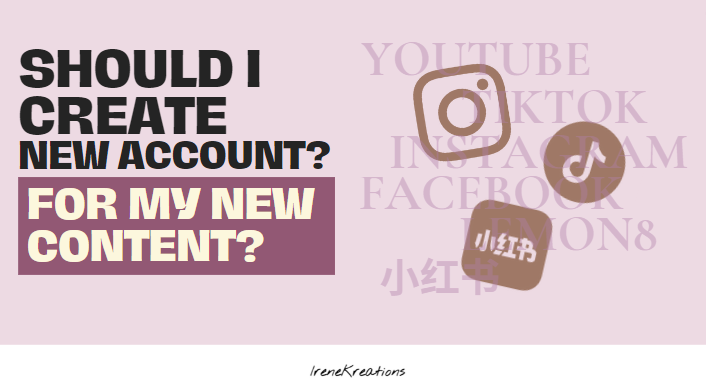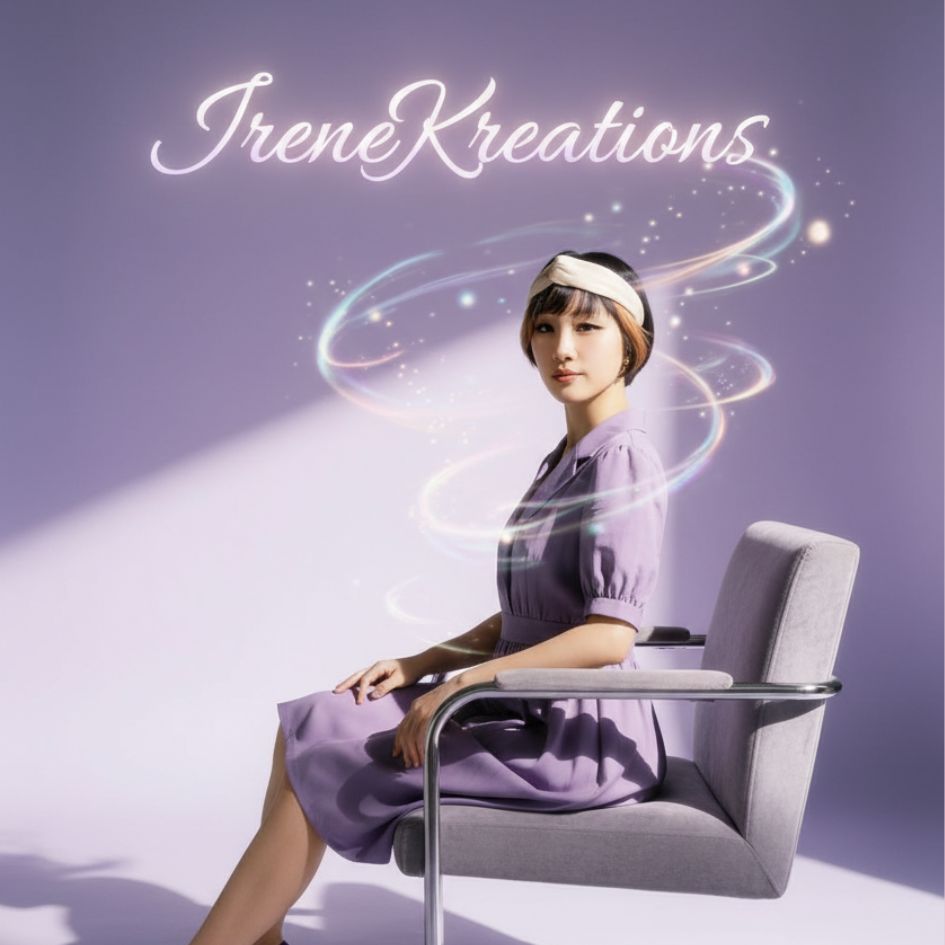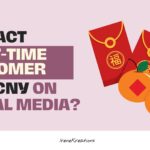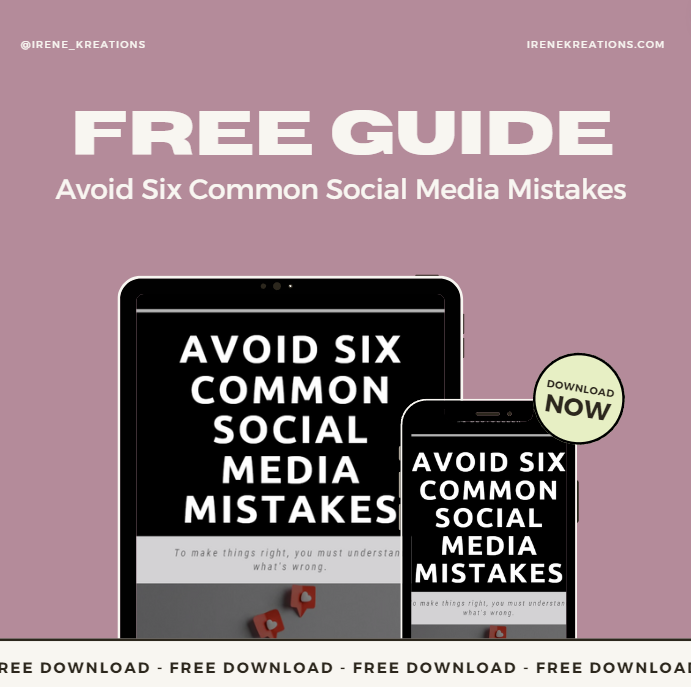Short answer is, it depends.
This is actually a very common question that many people struggle with when planning to create a content-focused social media account. Deciding whether to start fresh or use your personal account can be tricky.
For many small business owners and solo content creators, the first question is simple — but loaded:
“Should I post my business content on my personal social media, or start a separate account?”
It sounds easy, but the decision has long-term impact on your brand perception, credibility, and mental bandwidth. At IreneKreations, we guide purpose-driven creators to clarity first, content second, so your social media becomes a reflection of your values — not a copy of what’s trending.
Starting a New Account:
- Brand Consistency: If your current account lacks a cohesive theme related to your upcoming content, starting fresh can benefit your branding.
- Target Audience: If your current followers aren’t interested in your upcoming content, a new account can attract the right audience and make the algorithm right.
- Clean Slate: A new account gives you a fresh start without old posts or associations that don’t align with your upcoming content creation and marketing goals.
Continuing with Your Old Account:
- Existing Followers: If you already have a decent following, it’s easier to leverage them to kickstart your upcoming content journey.
- Established Identity: If your current account reflects your brand and content, it saves time in building a new following.
- Engagement: If your current followers are engaged, it’s beneficial to continue growing your influence on the same account.

When considering a change in content creation direction for your existing account, here are some questions to ask yourself before diving into the content game:
(1) Why am I changing my content direction?
What are the reasons behind the shift, and what do I hope to achieve?
(2) Is my new content direction aligned with my goals and values?
How does the new direction fit into my overall vision for my account?
(3) Who is my target audience for the new content?
How will this change affect my current followers, and will it attract a new audience?
(4) How will I transition my existing audience to the new content?
What steps will I take to inform and engage my followers during the transition?
(5) What changes do I need to make to my content strategy and branding?
How will I adjust my posting schedule, content style, and visual branding to reflect the new direction?
(6) How will I measure the success of the transition?
What metrics will I use to track the impact of the change, and how will I know if it is successful?
(7) Am I prepared for potential challenges or resistance from my audience?
How will I address negative feedback or concerns from followers during the transition?
(8) What resources or support do I need to make this change successfully?
Do I need to collaborate with others, seek advice, or invest in new tools or skills to support the new content direction?
Personal Account vs. New Account: What You Need to Consider
(1) Using Your Personal Account
Pros:
- Already has followers
- Easier engagement
- Feels authentic
Cons:
- Harder to separate personal opinions from professional voice
- May confuse your audience if you post mixed content
- Limits long-term credibility if you scale your business
(2) Creating a New Account
Pros:
- Allows clear brand identity
- Content strategy can be consistent
- Easier to position yourself as an authority
Cons:
- Slower initial growth
- Requires extra management
- Takes intention to maintain authenticity
Rule of thumb:
If your goal is to teach, guide, or provide value aligned with your business, a separate account usually works best. Your personal account can remain personal, while your content account builds trust and authority.
When starting a new account, here are some questions to ask yourself before diving into the content game:
(1) What is my niche?
What specific topic or area do I want to focus on?
(2) Who is my target audience?
Who am I creating content for, and what are their interests and needs?
(3) What is my unique value proposition?
What makes my content different or better than others in the same niche?
(4) What is my brand identity?
What tone, style, and aesthetic will I use to represent my brand?
(5) What are my content goals?
What do I want to achieve with my content (e.g., brand awareness, engagement, sales)?
(6) How often will I post?
What is a realistic posting schedule that I can maintain consistently?
(7) What types of content will I create?
Will I focus on photos, videos, reels, stories, or a mix of these formats?
(8) How will I engage with my audience?
What strategies will I use to interact with my followers and build a community?
Why Most Courses Don’t Teach This Part
Many online courses focus on:
- “What platform to use”
- “Posting frequency”
- “Content templates”
They rarely cover:
- How to decide which account fits your brand
- How posting habits affect credibility
- How identity and values shape consistent messaging
At IreneKreations, we provide real, actionable coaching grounded in actual agency experience, helping you make decisions that fit your brand and energy — not someone else’s trend.
How Personal Branding Helps You “Sell Without Selling”
“If marketing feels fake, you’re using someone else’s voice.”
Personal branding is less about posts or tools, and more about clarity of identity. For small business owners:
- Builds familiarity before demand
- Creates emotional safety for your audience
- Reduces friction when offering services or products
When your brand is clear, people self-select. You don’t need hard selling — your content reflects your values and attracts the right audience naturally.
IreneKreations’ Approach to Social Media Branding
IreneKreations exists to guide business owners back to clarity and foundation.
We help brands:
- Communicate with purpose
- Show up with calm confidence
- Build long-term trust and authority
We teach you to think about content, branding, and AI intentionally, so every post feels aligned, thoughtful, and true to your voice.
Last but not least, here are a few other factors that could help you make your decision:
-Having many “friends” doesn’t mean they’re right as your new audience.
Having a personal social media account with many friends who aren’t interested in your future posts can hurt your algorithm. Some people follow me for personal updates and may not engage in certain posts. Starting new accounts prevents uninterested followers from seeing your content, making space for engaged followers who may become clients. Despite having over 10k followers, most aren’t my friends or acquaintances. I use an 80/20 rule, with 80% of my content focusing on my influencing adventure and 20% on personal updates, as this account originated as a personal one.
-You’re a small business owner with a personal brand
For small business owners with a personal brand, consistency across all platforms is crucial. Your profile is often the first thing people see. If you want to keep your personal and business brand separate, opening a different account is wise.
Your followers will understand if they see two different handles, recognizing some overlap. Although this may seem inconvenient, it’s beneficial considering the number of people on social media looking for services/products. Being searchable and distinct is key.
-Mental Wellness, Detox & Freedom
Separating your personal account from your personal brand or business account can be beneficial for mental wellness, detox, and freedom purposes. It allows you to create a clear boundary between your personal life and professional endeavors, reducing stress and maintaining a healthy work-life balance. Additionally, having a separate business account can provide a sense of freedom, allowing you to express your brand’s identity and values without the constraints of personal relationships or opinions.
Top 5 Ways IreneKreations can help you with Brand Clarity
(1) Brand Essence First, Not Trends
Before posting, we clarify your identity — who you are, what you stand for, and how your brand should feel.
(2) Focus on Credibility, Not Just Visibility
Our strategies are designed for business owners who want trust, authority, and long-term brand value, not just likes or followers.
(3) Sensitive to Emotional Impact & Tone
We ensure your content feels aligned, safe, and respected by your audience.
(4) Realistic Systems, Not Burnout Strategies
Content workflows fit your time, energy, and capacity, so consistency is natural, not exhausting.
(5) Pre-Trend Insight, Not Outdated Playbooks
As a Marketing Agency owner and Social Content Brand Coach that is active, we spot subtle shifts early — helping clients stay ahead without chasing noise.
People are also asking:
Should I use my personal social media account for business content?
For most small business owners, separating accounts helps clarity, credibility, and long-term trust.
Can I merge personal and business content successfully?
Yes, if your values, tone, and purpose align — but it requires intentional strategy.
How do I decide if a new account is worth starting?
Ask: “Will this account reflect my brand consistently without confusing my audience?”
How fast can I grow a new content-focused account?
Growth depends on consistency, clarity, and value. Many Singapore SMEs see steady results in 3–6 months.
Can personal branding help me sell without selling?
Yes — clear branding builds trust, authority, and recognition, so your audience engages naturally.
What’s the biggest mistake Singapore SMEs make on social media?
Starting with tools or trends without clarifying identity and purpose.
Should I hire an agency or DIY my account?
If you want strategic guidance and sustainable systems, coaching with IreneKreations is a middle path — you remain in control, but gain professional insight.
How do I keep content aligned across multiple accounts?
Use brand frameworks, tone guides, and workflow systems — not just posting schedules.
Can AI replace content creation?
AI assists efficiency, but strategy, identity, and emotional nuance cannot be automated.
Is it normal to feel inconsistent when managing multiple accounts?
Yes — inconsistency usually signals identity misalignment, not lack of skill.
Final Thoughts
“Handing over your brand shouldn’t feel like giving up your voice.”
Starting a content-focused account isn’t about tools, followers, or trends.
It’s about clarity, alignment, and intentionality.
Whether you choose your personal account or a separate one, the key is thinking first, posting second.
So the question becomes:
Which account will truly reflect who you are — and who you want your audience to trust?
✧⭒✦✧⭒✦◇ Ready to Level Up Your Socials? ✦⭒✧✦⭒✧
Still struggling with messy marketing or feel lost on social media? It’s time to change that. Dive into IreneKreations’ Recommended Social Marketing E-Books — a curated library filled with FREE and premium guides crafted for business owners who want real, lasting results.
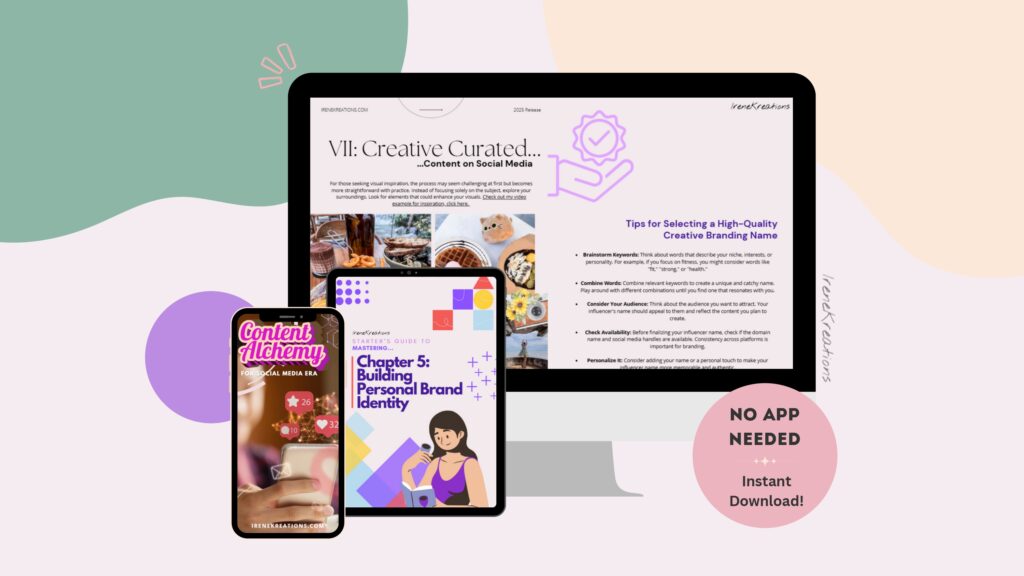
From social media to content strategy and branding, these resources are your shortcut to making marketing finally make sense (and work).
Instant access. Powerful strategies. Business-ready results.
Join IreneKreations Telegram Channel for More FREE Social Content Tips here

